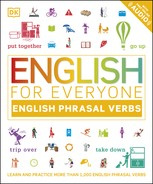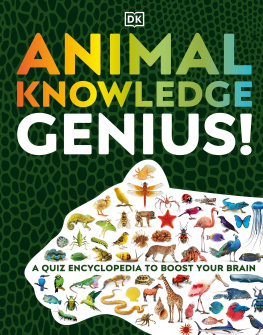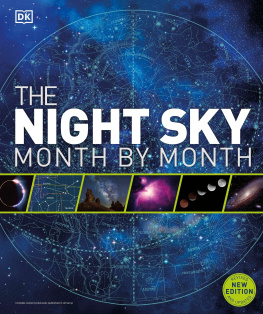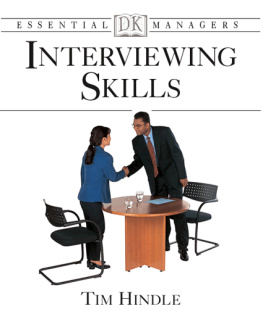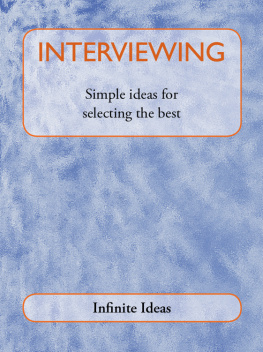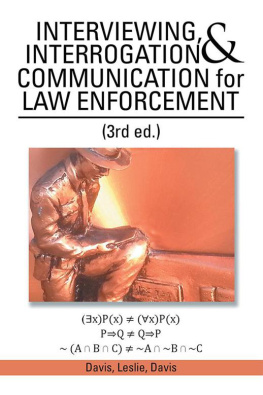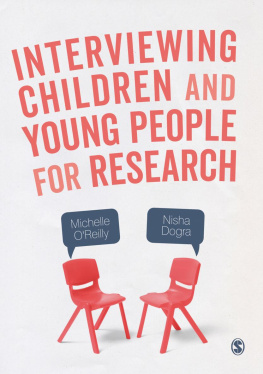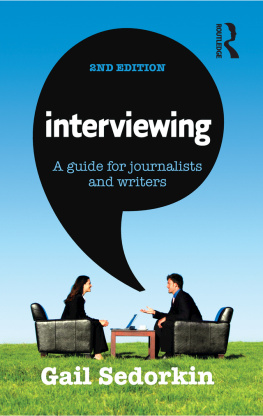DK - Interviewing People
Here you can read online DK - Interviewing People full text of the book (entire story) in english for free. Download pdf and epub, get meaning, cover and reviews about this ebook. year: 2009, publisher: DK Publishing, genre: Home and family. Description of the work, (preface) as well as reviews are available. Best literature library LitArk.com created for fans of good reading and offers a wide selection of genres:
Romance novel
Science fiction
Adventure
Detective
Science
History
Home and family
Prose
Art
Politics
Computer
Non-fiction
Religion
Business
Children
Humor
Choose a favorite category and find really read worthwhile books. Enjoy immersion in the world of imagination, feel the emotions of the characters or learn something new for yourself, make an fascinating discovery.
- Book:Interviewing People
- Author:
- Publisher:DK Publishing
- Genre:
- Year:2009
- Rating:4 / 5
- Favourites:Add to favourites
- Your mark:
- 80
- 1
- 2
- 3
- 4
- 5
Interviewing People: summary, description and annotation
We offer to read an annotation, description, summary or preface (depends on what the author of the book "Interviewing People" wrote himself). If you haven't found the necessary information about the book — write in the comments, we will try to find it.
DK: author's other books
Who wrote Interviewing People? Find out the surname, the name of the author of the book and a list of all author's works by series.
Interviewing People — read online for free the complete book (whole text) full work
Below is the text of the book, divided by pages. System saving the place of the last page read, allows you to conveniently read the book "Interviewing People" online for free, without having to search again every time where you left off. Put a bookmark, and you can go to the page where you finished reading at any time.
Font size:
Interval:
Bookmark:

80 Strand, London WC2R 0RL
LONDON, NEW YORK,
MUNICH, MELBOURNE, DELHI
London WC2R 0RL, England
Copyright 2008 Dorling Kindersley
Text Copyright 2008 DeeDee Doke
Digital conversion by DK Digital Content, London and DK Digital Media, Delhi.
No part of this publication may be reproduced, stored in a retrieval system,
or transmitted in any form or by any means, electronic, mechanical, photocopying, recording, or otherwise, without the prior written permission of the copyright owner.

The key to success for any organization is its people. Getting the right people depends on how an organization recruits, and a fundamental element of the recruitment process is interviewing.
As the business environment becomes more dynamic, organizations needs change, and so do the skills they require of their employees. Moreover, simply having the right skills does not guarantee that a candidate will benefit your organization. Todays most creative and progressive recruiters recognize that understanding the aptitudes, attitudes, and motivations of their employees is essential to ensuring that the people they hire represent the best possible fit for current vacancies. As a result, those who conduct job interviews on behalf of their organizations not only hold the present, but also the future of their employer squarely in their hands. That is a big responsibility.
The goal of Interviewing People is to guide you through the minefield of interviewing candidates: organizing interviews and other supplementary activities, helping you to ask the right questions, deciding which information sources you should consider in finding out who the person really is, and preparing the groundwork for successful partnerships between the new employees and your organization. The end result should be to make interviews rewarding for candidates and recruiters.
Planning the Interview
Interviewing a potential recruit is a long and complex process, but the reward is seeing the person you interviewed contributing to your organizations success and happy in their job. Achieving that success takes careful planning.
Your checklist is your step-by-step guide to ensuring that you and your organization make the most of the candidate interviews. Create it at the very beginning of your recruitment process so that you can always visualize where you are at a given moment and what you need to do next.
Preparing for and conducting an interview involves a number of steps. However, the actual interview is only one part of the process. Your checklist should cover the steps required before the interview, during the interview, and afterward. Your plan should also incorporate points along the way at which you assess progress to date and make any necessary amendments. Leave room to add extra stages, if necessary. Remember, it wont always be possible to execute each step perfectly. Concentrate on fulfilling each point and keep a record of what you do and the results.
First, analyze and understand the job itself and its significance in your organization. Next map out the steps of your strategy for filling it: where you will publicize the vacancy, what support you will need to screen and rank incoming resumes, how to define your shortlist, the kinds of questions to be asked of candidates at interview, and selecting any other measures that would be required to supplement the interviews. Then there will be logistics issues to be worked out, such as where the interviews will be held.
Know what your budget is from the start; finances play a role in identifying top, secondary, and optional priorities on your checklist. One key spend is likely to be on recruitment advertising. Hiring a venue for interviews and getting expert help to assess candidates skills may also mean spending some money. Get estimates on every expenditure before you spend anything.
 Pre-interview planning
Pre-interview planningDo I understand the job and where it fits in my organization?
Have I planned a recruitment/interview/assessment budget?
Have I decided whether supplementary meetings such as assessment centers are necessary?
Have I placed the recruitment advertisements in appropriate media?
Have I considered meeting places and venues for interviews?
Have I designed the questions?
Have I decided on the interview format (panel or pair, for example)?
Have I worked in reassessment times to look back at what I have accomplished to date and consider what needs to be done next?
 Plan till the end
Plan till the endInclude time in your plan to check references and make an offer once you have chosen a candidate.
 Solicit employee referrals
Solicit employee referralsReward employees for recommending friends and relatives for jobs in your organization. The new employee gets recognition, and the organization gets a well-recommended new employee.
The job profile starts by acting as a sort of recipe for the person you are looking for, but comes to define expectations of the job holder as well as aspects of your organizations purpose. The profile reveals one individual piece of how your organization sees its future.
A well thought out job description can help to attract candidates who are right for the job. It also serves as a foundation for appraisals and employee development plans, and it outlines for both job holder and manager the rules of the game in day-to-day activities and over the long term. The person specification, which is often part of the job description, defines the kinds of education, experience, skills, and personal characteristics that are likely to be necessary to succeed in the job.
You may be filling an existing job that has just been vacated. A vacancy provides an opportunity to consider the continuing need for the job. If a need remains, then examine whether the role demands the inclusion of new responsibilities, competencies, and knowledge. Keep in mind that as organizations evolve, their needs and strategy change, and so must the dimensions of the work and the jobs created to carry out that work. Think about how your organization is changing and how changes impact the role.
 What are the job requirements
What are the job requirementsWhy does this job exist?
What must this job holder achieve for the organization?
Which responsibilities could be reallocated to allow the addition of new ones?
What changes are planned for the organization that could affect this job?
Font size:
Interval:
Bookmark:
Similar books «Interviewing People»
Look at similar books to Interviewing People. We have selected literature similar in name and meaning in the hope of providing readers with more options to find new, interesting, not yet read works.
Discussion, reviews of the book Interviewing People and just readers' own opinions. Leave your comments, write what you think about the work, its meaning or the main characters. Specify what exactly you liked and what you didn't like, and why you think so.



